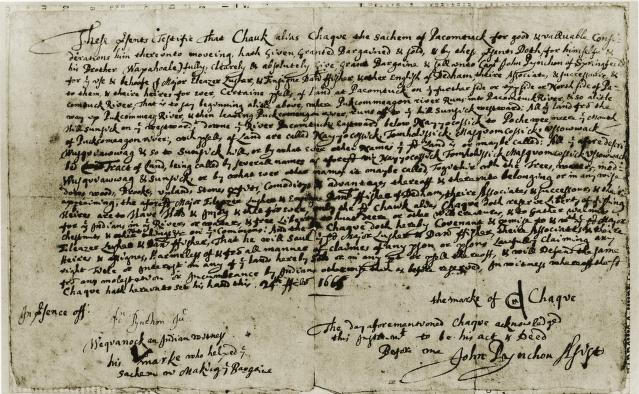|

(c) Pocumtuck Valley Memorial Association, Deerfield MA. All rights reserved.
Understanding Landscapes : A Howling Wilderness?
|
|
In 1631, John Winthrop of Boston spent a terrifying night walking up and down in front of his fire, singing psalms to keep up his spirits in the dark and frightening forest in which he had lost his way--a half mile from his house. For John Winthrop and his fellow colonists, they had immigrated to a "howling wilderness." The land was not under active, European-style cultivation and there were no permanent, year-round dwellings. In their minds, the land was empty, there for the taking. Roger Williams, a Puritan minster who eventually helped to found Rhode Island, was unusual in his insistence that the King of England had no right to grant land that belonged to Native inhabitants. John Cotton, another minister and immigrant to Massachusetts Bay, expressed the more common belief when he wrote, "In a vacant soyl, he that taketh possession of it, and bestoweth culture and husbandry upon it, his Right it is."
In actuality, the original inhabitants had modified this supposedly vacant landscape through thousands of years of hunting, gathering, planting, and settlement. The way in which Native Americans moved across the land for different purposes and at different seasons was, however, an unfamiliar concept to the sedentary English. Too, epidemics of Old World diseases had ravaged many native groups and depopulated many areas before the first European settlers arrived. This encouraged newcomers like Robert Cushman of Plymouth to consider the land they saw as "spacious and void."
This document is a deed for land purchased from the Pocumtuck Indians in 1666. The land transferred in the deed became the present-day town of Deerfield, Massachusetts. Whether or not the Pocumtuck Sachem, Chauk, could or intended to sell land to the English is debatable. Sachems were Native American leaders who commanded considerable religious and economic authority over a community. Evidence exists that some Sachems dispensed land use rights to various tribal members and negotiated treaties with other groups. To alienate land completely, however, may have been beyond the authority of any one individual. Some of the language in the deed suggests that Chauk viewed the agreement as a traditional transfer of land use. Note how he reserved for the Pocumtuck fishing, hunting and gathering rights on the very land he had just "sold." The contradictory language of the deed exposed the differences between European notions of exclusive land ownership and Native beliefs of land stewardship and usage. These ideas were ultimately incompatible. Disagreements immediately arose as settlers moved into Deerfield and elsewhere and asserted what they saw as their exclusive rights to the land they had purchased. These conflicts over the land yielded tragic results.
top of page
|
Deed of Pacomtuck land granted by Chauk to Dedham residents
| creator Chauk alias Chaqve, sachem of Pacomtuck (1665-1703) |
| date Feb 24, 1667 |
| location Deerfield, Massachusetts |
| height 7.5" |
| width 12.0" |
| process/materials manuscript, paper, ink |
| item type Legal Documents/Deed |
| accession # #L98.012 |
|





